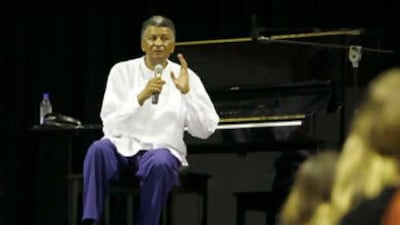ABU DHABI // Abdullah Ibrahim, one of the foremost jazz pianists in the world, wants to take his melodies to the next generation of musicians. Ibrahim, 74, who will perform in Abu Dhabi with his seven-piece ensemble in the Abu Dhabi Classics series next month, was in town this week to introduce schoolchildren to jazz. "Children are the best audience," he said. "They have very little filters. They just absorb. It's the same everywhere around the world with children. "What I try to tell young people is to be as sincere as possible when they play. The intention is not to send a message always." Ibrahim's work in Abu Dhabi is part of a new venture to expose pupils to music. He will begin with private schools that already have music programmes, and slowly expand to work with public schools. "We have to find some way with music education. We have to rethink the ways in which we do it and it has to come from the communities first rather than just teaching it in the classrooms," he said. Ibrahim, in three sessions at the American Community School, played two pieces and talked about his childhood in South Africa, his introduction to music and his initial inability to master the piano and the frustration that accompanied it. The stories delighted the young music lovers gathered in the school auditorium. Rachelle Ibrahim, 13, who used to play the trumpet, said she would like to learn the saxophone. "I learnt from him that over time you get better and better and over time, you get it, just like he did with playing the piano," she said. Emily Rose Breault, 13, who had to choose between art, drama and music in her previous school, said she was inspired by Ibrahim's presentation and was keen to take up music again. "From him I understood that even if you are not good straight away you have to do it. He showed us that. Every day, he achieved his dreams. He didn't stop." Ibrahim arrived here after a concert in Germany. He got up early on Monday to talk to the children, and took in the sights of the city in the afternoon. "From what I have seen, I love it," he said as he sat in the lobby of the InterContinental Hotel. "It has great potential because there is global vision. This is the new world. Just look around you." Ibrahim said his mother and grandmother, who were pianists at church, introduced him to the instrument. He learnt covertly from local school teachers, who were not allowed to openly teach non-white children under apartheid. "The regime denied us many things, even the teachers who were brilliant with such passion for music had to learn it through correspondence courses. And they gave us such grounding in the universal tradition of music." Growing up in the 1960s in Cape Town, a port city that attracted different musical and cultural influences, Ibrahim took time to absorb other forms of music, including Indian classical, folk music from Malaysia and western classical music - mostly from radio programmes. "There was robust cultural activity in spite of the problems of the regime," he said." But music knows no boundaries. It transcends cultural and social norms. As a musician, a composer, you have this insatiable appetite to learn more music all the time. So we played on. I first started playing at the church and in community centres." Ibrahim, raised as Adolph Johannes Brand, was drawn to Islam in his youth, soon after he became famous. He remembers being worried about his lifestyle as a musician, and trying to find an explanation for the discrimination and violence of apartheid. He looked for an answer that would include "peace and serenity". "I grew up in a gang-infested society. It came at a time when the social milieu was violent. I was also introduced to alcohol and drugs as a musician and I became very ill." Ibrahim said he grew up with Muslim friends. "At an early age I was drawn to Islam anyway, then I discovered tauheed, or unity, that is defined in Islam. And that answered the inequality that I saw around me." sbhattacharya@thenational.ae

Pianist takes his message to school
Abduallah Ibrahim, the renowned jazz pianist, introduces children to his music in Abu Dhabi ahead of his performance next month.
Most popular today
